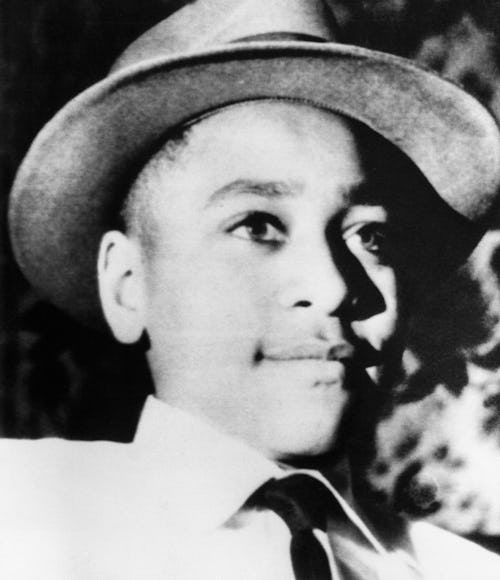Who gets to tell Emmett Till's story?
Students are protesting an opera they claim centers white guilt. The show’s creators completely disagree.

Given the nature of Emmett Till’s death and its clear message about Blackness in America, art that aims to honor his legacy aways carries a certain weight of responsibility. That’s more evident than ever now; a new opera is under scrutiny this week for allegedly centering a white lead and white guilt instead of Till’s and his family’s plight.
The show, “Emmett Till, A New American Opera,” will be performed at John Jay College's Gerald W. Lynch Theatre in New York City tonight and tomorrow. Synopses about the show, posted everywhere from Playbill.com to various social media accounts, describe the project as a story about the death of Till, a 14-year-old boy from Mississippi who was violently murdered in 1955 for allegedly flirting with a white woman. Till’s body was mutilated and flung into the Tallahatchie River, where it was found days later and became a persisting and powerful symbol of the horrors of Jim Crow and American racism.
Any art around Till’s story should, of course, be crafted with the utmost regard for his story and its impact on the Black community. But many people are taking issue with the fact that this opera was written by a white librettist, Clare Coss, who is being accused of centering a fictional white woman character named Roanne Taylor and her guilt about segregation. Upon first glance, this looks messy as hell, and definitely worthy of backlash.
A change.org petition by John Jay student Mya Bishop that went viral and has garnered more than 13,000 signatures demands that the play be canceled. “Telling the story from the perspective of a fictional progressive white woman shows that Clare Coss is more concerned with showing the audience that ‘not all white people are bad’ than she is with the ongoing fight for racial justice,” the petition reads. The petition also noted that the price of admission is between $20 to $1,000, which means that Coss and her team (which include Black artists) would be profiting from Black pain.
Tania León (Conductor), Mary D. Watkins (Composer) and Clare Coss (Librettist).
We had to dig into what was really going on with this production — and that meant hearing from everyone we could get ahold of. First off, Nina Flowers, a spokesperson for the production, informed me that Clare Coss is not sole creator and driver of the opera when; it is co-created with renowned Black woman composer Mary D. Watkins (indeed, Watkins’s name is not mentioned in the petition). From this point on, we can all argue about who has more creative control over the project but we’d be wrong to minimize Watkins’s contribution to the project. Pulitzer Prize-winning composer Tania León, who is also Black, will conduct a 27-piece orchestra. Flowers confirmed that the proceeds from the premiere will go to The Emmett Till Legacy Foundation but did not have an exact percentage at the time of publication.
“Even though there are many artists of color involved in this project, the critics are assuming that we have had no impact on the final shape of the piece and that the playwright has somehow forced all of us to tell her story,” Watkins told the Washington Post. “It is an insult to me as a Black woman and to the cast members who are African-American.”
That’s fair. But I think the part that rubs us all the wrong way is the claim that the story fueling the opera sympathizes with a white character instead of focusing on Emmett Till’s life and the injustices that killed him. It appears that that’s what rattled Bishop as well. She told me that what she’d read about the play was that it was going to be told through the lens of Roanne Taylor. The idea that the story itself would be spun from a white central character’s psyche felt like betrayal.
“As a John Jay student, it would mean something for me to create the petition being that the play is premiering under our roof,” Bishop told me, “There was a lot of unfocused criticism about the opera's premise, and creating the petition allowed for administration to see exactly how many people have a problem with it.”
Flowers asserts that the play does not center the fictional white character, Roanne Taylor, but uses her as an example of white silence. The production team also justified Coss’s right to tell the Emmett Till story by saying that she and Watkins both attended high school and college in the South when Till was lynched and that news of his murder “resonated with her deeply and stayed with her over the years,” urging her to engage in activism.
That’s fair, but having a leadership position in this case is still fraught. Does Coss’s emotional reaction to the violent murder of a Black person give her the right to tell this story? Does a white person who watched George Floyd’s murder on TV have the right to spearhead a movie about the Black Lives Matter protests that ensued? Bishop’s unease towards the project comes from a valid place.
Another important point to consider, though, is that no one’s seen this show yet, so it could be wise to have this whole conversation next week. Reading about it can only prove so much. Only after we watch this play for ourselves — or least see what type of reception it gets — will we be able to make judgements with a little more clarity.